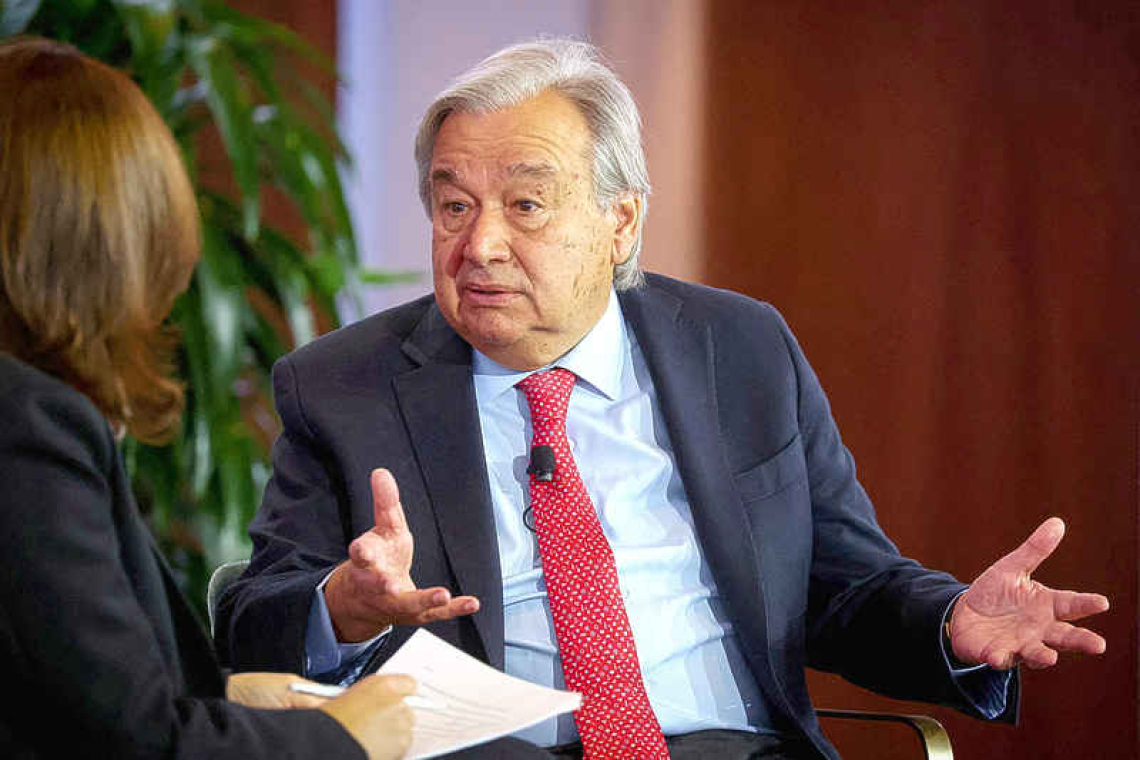NEW YORK--United Nations Secretary-General Antonio Guterres said on Wednesday that the number of civilians killed in the Gaza Strip shows that there is something "clearly wrong" with Israel's military operations against Hamas Palestinian militants.
Israel has vowed to wipe out Hamas, which rules the Gaza Strip, after the militants killed 1,400 people and took more than 240 hostages in an Oct. 7 attack. Israel has struck Gaza - an enclave of 2.3 million people - from the air, imposed a siege and launched a ground invasion. "There are violations by Hamas when they have human shields. But when one looks at the number of civilians that were killed with the military operations, there is something that is clearly wrong," Guterres told the Reuters NEXT conference. Palestinian officials said 10,569 people have now been killed in Gaza, 40% of them children. "It is also important to make Israel understand that it is against the interests of Israel to see every day the terrible image of the dramatic humanitarian needs of the Palestinian people," Guterres said. "That doesn't help Israel in relation to the global public opinion." Israel's U.N. Ambassador Gilad Erdan rejected Guterres' remarks and said that the death toll given by the health ministry in Gaza could not be trusted. He said Israel was working to limit civilian casualties, citing an evacuation corridor, while Hamas targets civilians. "Would the Secretary-General dare say that since the number of German civilian casualties during World War II was higher than American or British civilian casualties, it meant that something was 'wrong' with the U.S. and UK military operations when fighting a genocidal regime?" he told Reuters. While strongly condemning the Hamas attack on Israel, Guterres said that "we need to distinguish - Hamas is one thing, the Palestinian people (are) another." "If we don't make that distinction, I think it's humanity itself that will lose its meaning," Guterres said. Guterres compared the number of children being killed in Gaza with the toll in conflicts around the world that he reports on annually to the U.N. Security Council. On Monday, he said Gaza was becoming "a graveyard for children." "Every year, the highest number of killings of children by any of the actors in all the conflicts that we witness is the maximum in the hundreds," Guterres said. "We have in a few days in Gaza thousands and thousands of children killed, which means there is also something clearly wrong in the way military operations are being done," he added. The U.N. report on children and armed conflict includes a list intended to shame parties to conflicts in the hope of pushing them to implement measures to protect children. It has long been controversial, with diplomats saying Israel exerted pressure in recent years in a bid to stay off the list. In June, Guterres added Russia's armed forces to the report's list of offenders after the United Nations verified that they killed 136 children in Ukraine in 2022. The next report is due in mid-2024. Guterres described the humanitarian situation in Gaza as "catastrophic." The U.N. chief has been pushing for a humanitarian ceasefire to allow aid access to Gaza. He also said 92 people working with the U.N. Palestinian refugee agency (UNRWA) have been killed. "It is absolutely essential - absolutely essential - to have a flow of humanitarian aid into Gaza that corresponds to the dramatic needs that the population is facing," Guterres said. The United Nations has been working to increase humanitarian aid deliveries to Gaza. Guterres said that in the past 18 days only 630 trucks had been able to enter via the Rafah border crossing from Egypt. The United Nations also wants to be able to use the Kerem Shalom border crossing, controlled by Israel. "We are in intense negotiations with Israel, with U.S., with Egypt, in order to make sure that we have an effective humanitarian aid to Gaza," Guterres said. "Until now it has been too little, too late." When it comes to what happens in Gaza after the fighting ends, Guterres outlined what he described as a "best-case scenario" - that "hopefully a re-invigorated" Palestinian Authority could assume political control. Guterres acknowledged that there would have to be a transition period negotiated with the Palestinians and Israel. He called it "premature" to talk about a possible future U.N. peacekeeping force, saying such a move has not been discussed at the world body. "Several entities can play a role. The U.N. can play a role. Several countries that are relevant in the region can play a role. The United States can play a role," said Guterres, adding that this should then be the starting point for "a serious negotiation for the two-state solution" with a Palestinian state existing alongside Israel.







